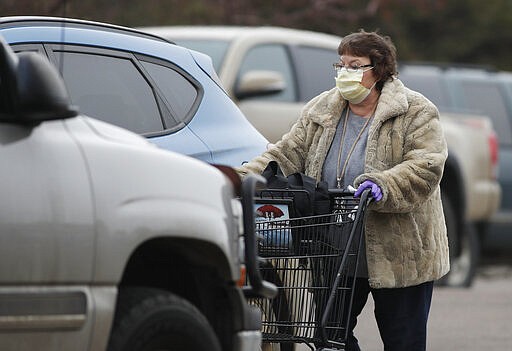More records broken in virus-related Colorado jobless claims
James Anderson | Hagadone News Network | UPDATED 5 years, 10 months AGO
Emilio Fernandez has worked for a restaurant chain for eight years and signed up with Rover, an online dog walking service, to pad his income. Then the coronavirus hit.
Now the Denver resident works one shift a week at the restaurant. He has stopped walking dogs, fearing he will get sick by entering unknown people’s homes to pick up and drop off their pets.
“I’ve worked hard my entire life. I’ve all but stopped working, and we all are trying to figure out how to make ends meet,” Fernandez said Friday. “And gig workers have to have some access to unemployment insurance.”
Help may be on its way for Fernandez, who spoke at a virtual news conference organized by the AFL-CIO of Colorado, even as Colorado’s unemployment claims keep setting records and one state analyst says there is no end in sight.
Thanks in part to the federal coronavirus emergency package, Colorado and other states are preparing to expand the categories of workers displaced by the virus who are eligible for assistance and increase payments.
Colorado will offer unemployment payments to gig workers, independent contractors and others currently not eligible. Benefits will rise from an average of $600 a week to $1,000. Requirements that applicants certify they’re seeking work are suspended, said Cher Haavind, spokeswoman for the Colorado Department of Labor and Employment.
It won’t alleviate today’s suffering; displaced workers may not see expanded benefits until mid-April.
A month ago, Colorado fielded 2,000 initial unemployment filings a week. Now it’s fielding up to 20,000 a day. Preliminary figures suggest more than 61,000 people applied through Thursday, easily topping last week’s record of 19,745 initial claims.
The previous state record was 7,749 at the height of the Great Recession in 2010, said Ryan Gedney, senior economist for the labor department.
“I would say we’re just seeing the beginning of this, to be honest,” Gedney said.
At least 31 people have died from COVID-19 in Colorado, and about 1,730 people have tested positive.
For most people, the new coronavirus causes mild or moderate symptoms, such as fever and cough that clear up in two to three weeks. For some, especially older adults and people with existing health problems, it can cause more severe illness, including pneumonia and death. The vast majority of people recover.
Gov. Jared Polis said Friday he could use state and federal emergency funds for 1,000 additional intensive care unit beds by May and 5,000 additional beds by this summer to address the pandemic.
Citing data from Colorado medical institutions and the state health department, the governor showed a series of charts at a news conference predicting that the number of deaths and the number of ICU beds needed will decrease with increased social distancing. The data also show there could be hundreds if not thousands of deaths in the state depending on how seriously people take the restrictions.
The state currently has 1,849 ICU Beds, half of which have been freed up for patients with the coronavirus. Colorado does not have enough ventilators to treat a possible surge in patients.
“We have about 900 ventilators in the state of Colorado. We need about 7,000,” Polis said.
A statewide shelter-in-place order, closures of “non-essential” businesses, bans on in-house restaurant dining and closures of ski resorts and other tourist destinations not only can reduce the virus’ transmission rate but ensure Colorado’s economy can quickly recover, Polis has said.
State figures released Friday show nearly 3.2 million people had jobs in this state of 5.8 million in February. The unemployment rate was 2.5%. The new virus-related measures have since accelerated unemployment claims.
Polis, a Democrat, has encouraged small firms to apply for low-interest emergency loans from the U.S. Small Business Administration. He directed state agencies and urged employers to offer temporary paid leave for Colorado workers who get sick. Sick leave allows them to recover at home and more quickly return to the workforce.
It’s something Ruben Tim Martinez, a Colorado Springs grocery store worker, says is essential for workers like himself who have found themselves on the front line of the pandemic.
“We did not sign up to be emergency first responders. But that is what we are,” Martinez said. “We, too, have children who are no longer in school and are at risk of getting sick. We don’t have the luxury of social distancing or staying at home.”
___
Associated Press writer Thomas Peipert contributed to this report.
ARTICLES BY JAMES ANDERSON
Wild horse roundups ramping up as drought grips the US West
TOOELE, Utah (AP) — The sound of the helicopter propeller thundered across the horizon as it dipped down toward mustangs dotting the golden brown plain. The horses burst into a gallop at the machine's approach, their high-pitched whinnies rising into the dry air.
Wild horse roundups ramping up as drought grips the US West
TOOELE, Utah (AP) — The sound of the helicopter propeller thundered across the horizon as it dipped down toward mustangs dotting the golden brown plain. The horses burst into a gallop at the machine's approach, their high-pitched whinnies rising into the dry air.
Wild horse roundups ramping up as drought grips the US West
TOOELE, Utah (AP) — The sound of the helicopter propeller thundered across the horizon as it dipped down toward mustangs dotting the golden brown plain. The horses burst into a gallop at the machine's approach, their high-pitched whinnies rising into the dry air.









